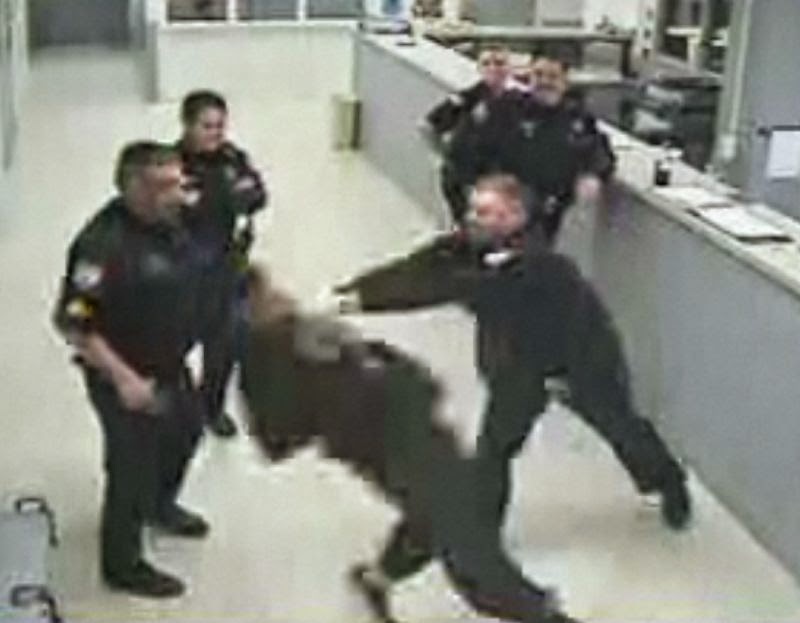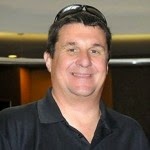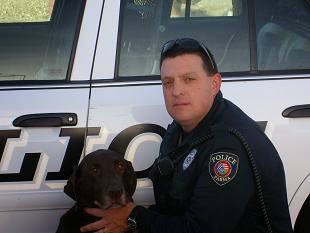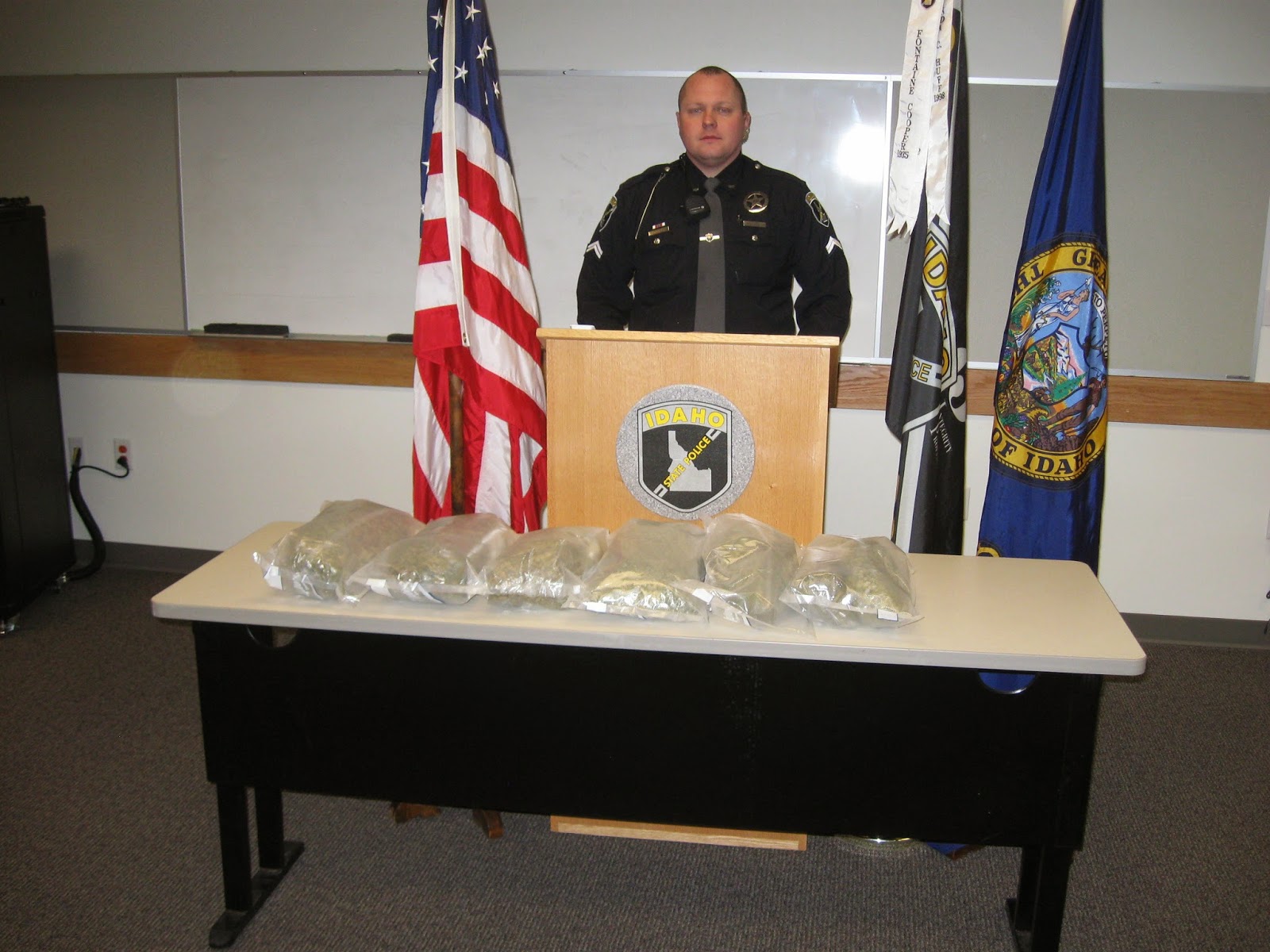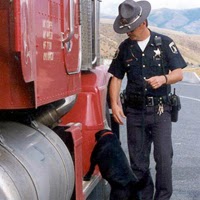Matthew Cherry
was twenty-one years old when he found himself in a police interrogation room.
At the time, he had the
psychological maturity of a bright 12-year-old boy. Thus it isn't surprising that Matthew was much
too trusting when Beaumont
Police Detective Mark Hogge assured the young man that they just needed to
clear things up about a reported off-color remark Matthew made to a member of
his church youth group after swimming at the local YMCA.
Nor should we be
surprised that the June 2004 interrogation, conducted without the benefit of counsel,
extracted a confession that would lead to Matthew’s conviction as a sexual
offender -- and a decade of unalloyed
misery for his family.
To be as specific
as decorum permits, Matthew made a disparaging comment about the size of the younger
boy's male member while the two of them were showering and getting dressed. Vulgar
and offensive remarks of that kind are commonplace in junior high locker rooms.
It's reasonable to believe that at some point in their lives the detectives who
interrogated Matthew had indulged in off-color banter of that variety.
Matthew maintained
that he never said or did anything to suggest that he was seeking to gratify a
sexual impulse. While his behavior may have been considered deplorable, there was
no evidence that it was predatory. However, no other word properly describes
the conduct of the police interrogators. They had a criminal complaint and a
compliant suspect – not a juvenile, but what the law in some jurisdictions considers
a “vulnerable adult” – who didn't understand what his captors intended to do
with him.
In addition to
various learning disabilities and developmental delays, Matthew suffered from
epilepsy and experienced Grand Mal seizures since the age of three. He was also
diagnosed with Tourette's syndrome.
An examination by
Dr. William Ondo at the Baylor College of Medicine found that Matthew had been
afflicted with “progressive tics” – speech, muscular, and behavioral – “for 11
years” before his arrest.
Those eccentricities would become more pronounced in
stressful situations, and were known to include “outbursts of phrases that
don't make sense or random thoughts that make others uncomfortable,” Dr. Ondo
observed. Assuming that the doctor was correct in his analysis, Matthew's
condition would explain why he would blurt out a puzzling and offensive remark
about another young man's private anatomy.
No allegation was
ever made that he touched the other young man in any way, or that his
adolescent remark could be construed as a sexual overture. A
court-ordered examination conducted in May 2005 by Dr. Edward Gripon, a
widely respected psychiatrist, concluded that although Matthew was “emotionally
immature [and] subject to poor judgment,” he “does not have a sexual
orientation … toward pedophilia” and “does not pose any significant threat
toward children.”
As a result of
lengthy and detailed examination, both Dr. Gripon and licensed psychotherapist
Ben Bell concluded that Matthew “fails to demonstrate any of the classic
symptoms normally associated with ANY psychosexual disorder.”
Those findings,
significantly, were made after Matthew had been charged with “lewd conduct” on
the basis of his disclosures to the detectives.
There
was no physical evidence of an assault. No eyewitnesses independently
verified the accuser’s story. If an attorney had been present during the
interrogation, Matthew would have been advised not to answer any questions. The
same advice would have been offered by his father Bob Cherry, a retired fire
fighter who worked for the City of Beaumont for 30 years, if he had been made
aware of what was going on.
Without evidence
beyond the unsupported word of a single accuser, Hogee and his partner needed a
confession – or the case would have evaporated quickly. Matthew didn't
understand the dangers of talking to the police, and his
opportunistic captors weren't going to clue him in.
Cast into the purgatory of
probation
Over the course
of two days, Hogee and his colleague skillfully groomed their subject, helping
him overcome a “memory
block” that prevented him from confirming the details of the accuser’s
story. After the third interrogation, Matthew
was handed a document and told to sign it.
“Your parents
don’t have to know,” Hogee
promised Matthew. “Sign it and it’s all over.”
Because of his
dyslexia, he wasn't able to read and understand the “generic
judicial confession” that was written
up by Hogee and presented to him. The
detectives who coaxed Matthew to sign his name soothingly assured him that the
paper simply contained his story of what had happened. They didn't burden him
with the knowledge that he was admitting to serious felonies.
Under questioning
Matthew
had repeatedly emphasized – albeit in unsophisticated language -- that he
hadn't done anything to arouse or satisfy a sexual urge. Just as he hadn't intended to commit a crime,
he didn't mean to confess to one. But Matthew was skillfully misled into
signing a confession, which meant that the “justice” system didn't have to
prove the charges against him.
The methods used
by police to lure Matthew into incriminating himself are quite common, and very
effective.
“I had a case
that was in many ways nearly identical to this one,” recalls Karyl Krug, a noted
criminal defense attorney who now lives in Phoenix after many years of legal
practice in Austin. “It involved a young Vietnamese refugee who spoke no
English whatsoever and suffered from severe mental limitations. He brushed up
against a young girl in a stairwell at the shelter where they lived, and social
workers claimed that he had touched her breast. So he was taken in for
questioning and signed a confession while being held in police custody without
an attorney or translator present.”
Because of Krug’s
timely and professional legal representation, that young man’s confession was
thrown out and the charge against him was dismissed without even leaving a
paper trail. Matthew Cherry didn’t enjoy similar good fortune. There was no
attorney present during his questioning, and the attorney his family hired
didn’t file a timely habeas corpus motion following his arrest.
“If the attorney
had filed a habeas motion right away, the confession could have been challenged
and may even have been suppressed,” Krug observes. However, on the basis of that
fill-in-the-blank confession, Matthew was indicted by the Jefferson County
Grand Jury. He was given a $100,000 bond
and “put into a cell full of inmates [with the guards] announcing that he was a
child molester,” his father recalls. “We had a friend who worked [at the jail]
who immediately pulled him out and put him into solitary confinement.”
This kept Matthew
alive long enough for his family to arrange for bail and hire former state
Senator Carl Parker as a defense attorney.
“When we took
Matt to Carl Parker and showed him Matt’s case, he said it shouldn’t be
anything to worry about; it was simply locker room horseplay and would probably
be dismissed,” Bob
Cherry related in a January 2008 letter to an attorney. “He told us not to
discuss it with anyone, not even family…. We asked exactly what he was being
charged with and were never told the charges.”
After six weeks
had passed without hearing anything from the court or their attorney, Matthew’s
parents found a job for their son as a security guard at an art museum.
A few days after
Matthew started work, his parents heard a knock on the door and “a large group
of police barged in the house with an arrest warrant for Matthew,” Bob
continues. “By protocol, they were supposed to contact his attorney and he
would bring him in.” At roughly the same time, another police contingent
arrived at Matthew’s place of employment. The officers who arrested him
announced within earshot of everyone that Matthew was facing a second charge of
lewd conduct with a child.
According to Bob
Cherry, Joe Bluell -- the father of the accuser -- disseminated news of
Matthew’s first charge within the church where Matthew was a youth counselor,
and in short order a second “offense” was dredged up – this
one involving an incident in which Matthew and a member of his youth group
jointly used a restroom at a Chevron station during a church trip. A second charge was added
to the indictment, and another $100,000 dollar bail bond was imposed.
The Cherry family
somehow found the money to pay the second bail bond. Three days later, Matthew
was arrested yet again, and a third $100,000 bond was inflicted on the already
over-leveraged family. The judge later explained that the third arrest and bond
were the result of a clerical error, but insisted that “we couldn’t get our
money back,” Bob recounts.
Matthew was
placed on a form of pre-trial probation and was ordered to undergo a
psychological evaluation. His parents paid for four examinations by four
different doctors, all of whom found confirmed that Matthew suffered from
epilepsy, Tourette’s Syndrome, and other afflictions – but displayed no
tendencies toward pedophilia.
Although the
trial judge took judicial notice of the fact that Matthew was mentally and
psychologically a minor, he ruled that the findings of those examinations would
not be admissible in his defense. Meanwhile, the Jefferson County DA’s office
was indicating its reluctance to try the case in court. The defense attorney
hired by Matthew’s family spared the DA’s office the trouble of a trial.
Immediately
before Matthew’s plea hearing, his attorney, Carl Parker – who had not pursued
a deal of any kind – blithely assured
him that in exchange for a guilty plea the 22-year-old would be given two years
of judicial probation, at the end of which his record would be cleared and he
wouldn’t have to register as a sex offender. Just minutes later, Circuit Judge Charles Carver
informed the stunned and intimidated young man that he faced up to ten years in
prison.
In the weeks
following Matthew’s conviction in August 2005, the family fired Parker and
hired Joseph Hawthorn to represent him. As it turns out, Parker -- a former Democratic state senator described as a "political hack" by a Texas defense attorney who worked for two and a half years in Beaumont -- may have been compromised, as well as incompetent.
While serving in the Texas Senate in the mid-1980s, Parker was indicted by the Jefferson County Grand Jury on multiple narcotics, obscenity, and prostitution charges. No public record exists of any action taken either to prosecute those charges, or to drop them.
After taking over the case, Hawthorn immediately filed a motion to withdraw Matthew’s guilty plea. He also requested a continuance, since the sentencing hearing conflicted with a previously scheduled court appearance to represent defendants in the Enron case. Hawthorn was present in the courtroom when Matthew’s sentencing hearing took place on September 12, but was not permitted to represent his client. Judge Carver capriciously ruled that because Carl Parker had been Matthew’s defense attorney when he pleaded guilty, he could not hire a new attorney or withdraw his pleas.
While serving in the Texas Senate in the mid-1980s, Parker was indicted by the Jefferson County Grand Jury on multiple narcotics, obscenity, and prostitution charges. No public record exists of any action taken either to prosecute those charges, or to drop them.
After taking over the case, Hawthorn immediately filed a motion to withdraw Matthew’s guilty plea. He also requested a continuance, since the sentencing hearing conflicted with a previously scheduled court appearance to represent defendants in the Enron case. Hawthorn was present in the courtroom when Matthew’s sentencing hearing took place on September 12, but was not permitted to represent his client. Judge Carver capriciously ruled that because Carl Parker had been Matthew’s defense attorney when he pleaded guilty, he could not hire a new attorney or withdraw his pleas.
The Jefferson
County assistant prosecutor generously
conceded that the sentence should be “weighed against the defendant’s prior
criminal history, which is none,” and admitted
that “on the scale of indecencies, if there is such a thing, that this is
towards the lower end of that scale.”
He quickly
recovered from that brief lapse, however, sternly insisting that the minimalist
nature of the offense – stupid words spoken at an inappropriate time by a young
man suffering from Tourette’s Syndrome – “does not excuse the defendant’s
behavior nor does it provide him any time of lessening of what he did to these
two victims.”
Judge Carver
sentenced Matthew to 10 years of adjudicated probation and “community service.”
He was required to pay fines and court fees, submit to expensive and open-ended
“rehabilitation,” and register as a sex offender for two counts of “indecency
with a child through exposure,” both of which related to incidents that
involved neither physical contact nor lascivious language.
One condition of Matthew’s probation was the requirement that he stay more than 1000 feet from a school. The home Matthew shared with his parents was located near an elementary school. Like most registered sex offenders, he didn’t have the financial means to rent a home, even if he found a landlord willing to have a registered offender as a tenant.
One condition of Matthew’s probation was the requirement that he stay more than 1000 feet from a school. The home Matthew shared with his parents was located near an elementary school. Like most registered sex offenders, he didn’t have the financial means to rent a home, even if he found a landlord willing to have a registered offender as a tenant.
The sentence
imposed on Matthew was Judge Carver’s last official act before
retiring. In January
2007, Matthew applied for a writ of habeas corpus, contending that Carver had
violated his right to counsel during the sentencing hearing. That application
was initially rejected. The Texas Court of Appeals reversed that ruling and
ordered a second habeas corpus hearing. The Jefferson County DA replied with a
motion of its own that gave the Appeals Court an excuse to
overturn itself by denying Matthew’s habeas corpus application on the pretense that he could
obtain “the requested relief by filing appeals,” rather than demanding that the
State actually prove the charges against him.
“The majority’s
decision effectively forces Cherry to rely on an attorney he did not want to
represent him” during the sentencing hearing to handle an appeal based on his
own ineffectiveness, McKeithen pointed out. “Under the majority’s logic, even
had Cherry perfected an appeal, he would be required to await the imposition of
a sentence and the outcome of his appeal before he could enforce his right to
counsel of his choice…. Even if his appeal proved successful, only after being
forced to suffer a trial result procured by an attorney not of his choice,
according to the majority, Cherry would … have the privilege of retrying his
case.”
In other words:
Matthew Cherry would have to allow himself to be convicted and sentenced
without mounting a legal defense before
he could hire a lawyer to defend himself.
Unremitting harassment
If things had
gone relatively well for Matthew, his probation would have ended in August of last
year. However, the probation system is designed to prevent positive outcomes.
Today, Matthew – now 32 years old – is in federal custody. He
awaits sentencing on additional charges after being arrested last summer by
US marshals in Honduras, where he had fled in violation of his probation.
Matthew was
arrested following an anonymous tip by someone who claimed that he was
“grooming future victims.”
Since the accuser, who remains unidentified, was aware of Matthew’s status as a
registered sex offender, it is possible – perhaps even likely -- that the
accusation refers to any contact he
might have had with children, as opposed to genuinely predatory behavior.
At the time he
fled to Honduras, Matthew had completed nine years of probation – only to be
told that his sentence, like that of Sisyphus, would
continue in perpetuity.
In compliance
with court orders, Matthew tried to attend school and get a job, but found that
probation “was like torture,” his father Bob wrote in a letter to a friend.
Officers from Jefferson County Probation and Parole “would call him any time he
had a final exam in college and they would never show up for his appointment.
[They would] show up at his work trying to get him fired constantly. [Matt]
wasn't allowed to attend family functions, church, shopping malls. [Probation
officials would] show up at our home just to hassle him. No dating was allowed,
he couldn't leave the county without permission. The police were even worse;
they came to his work several times a month.”
Like many others
in similar straits, Matthew took a guilty plea on a sex offender charge in
order to avoid being sent to one of the government’s rape factories. This meant
subjecting
himself to invasive psychological scrutiny – at his own expense -- that was
a form of sexual assault. It was a process akin to being charged a fee for the
privilege of being raped.
He was also
assigned to a “treatment group” that functioned like a “struggle session” in
Maoist China: He was expected, and required, to admit to things he didn’t do,
and to sexual urges he consistently denied (and that hadn’t been identified in
multiple clinical examinations). He
was required to file a “Weekly Sexual Impulse Report” that was both a
degrading inventory of his inner life and a handy instrument of
self-incrimination.
Because Matthew didn’t consider himself a pervert, and denied
doing anything to gratify a deviant sexual impulse, he
was thrown out of his treatment group and faced the prospect of being in permanent
“rehabilitation” until he was willing to submit.
When a young man
is placed on a parole and designated a sex offender, the
entire family is often put on probation and treated like criminals, and
this was certainly the case with Matthew's parents.
“The police would
pull us over on the road, search us, hold us for an hour interrogating us,” Bob
recounts. “They came at 2:30 am to our home several times a year. We dealt with
constant threats and harassment. We found signs in our yard with a picture of
Matt saying `Child molester lives here.’”
For a decade Bob
and his wife endured the pitiless scrutiny, and unremitting harassment, of
local law enforcement alongside Matthew. For his part, Matthew dutifully
underwent “programming” for his alleged pyschosexual disorder in the form of a
Relapse Prevention Course for Sex Offenders. After completing nine years in
that program, Matthew dared to indulge the fond hope that completion of the
course would leave him free to lead a relatively normal life.
That prospect was
demolished by the instructor, who reportedly told Matthew that “they would see
to it that more was in store for him for the next 10 years to follow,” recounted
his father in a despairing letter to then-Texas Attorney General (now Governor)
Greg Abbott.
In early 2012, a
SWAT team from the Department of Homeland Security raided the Cherry family’s
home.
“Our family was
subjected to hours of armed restraint and interrogation while the officers
searched our home and collected alleged evidence,” Bob
informed Abbott. “Although we know computers, cell phones, and our family’s
financial and business records were taken away, we have no idea what was
otherwise removed in the two truckloads taken by the officers, or what, if
anything, we will ever see again. Our son, Matthew, was left humiliated,
spread-eagle in the front yard for friends and neighbors to see.”
Matthew wasn’t
arrested, but the raid essentially ruined his prospects of continued employment
with a nearby computer store, where just days earlier he had been given a
promotion. A few weeks later, Beaumont Police officers came to the home to
arrest Matthew for an alleged job-related probation violation – namely,
accepting that promotion without getting permission to relocate to another
store in a different part of the city.
“Matthew had told
his probation officer about this change,” Bob Cherry explained, “but apparently
it was not what they had wanted of him.”
The officers
serving the arrest warrant didn’t find Matthew at home.
Denied any
prospect of rebuilding his life, Matthew finally succumbed to despair and
desperation. Without informing his probation officer,
he simply left without providing any indication of where he was going. It isn’t clear how he managed to
establish himself in Honduras, or why he chose a country that
is in some ways a more overt (albeit less comprehensive) police state than the
one that exists in the U.S.
The offenses for
which Matthew was convicted are not covered by the U.S.-Honduran
extradition treaty,
which means that his arrest could be considered an extra-judicial abduction. Two
of the counts in his federal indictment deal with “visual depictions of … a
minor engaging in sexually explicit conduct” on computers that were confiscated
in 2013. No details are listed in the indictment, and the charges will not be
contested in court.
Last December 17,
Matthew
signed a plea agreement that was sealed
by the court. On the same day, the “factual basis and stipulation by the
USA as to Matthew Thomas Cherry” was sealed by court order. We will probably
never know the nature of the “evidence” seized from Matthew’s computer, or the
means used by the U.S. Attorney to extract a guilty plea. One very good
possibility is that Matthew
could have been threatened with consecutive sentences of 15-40 years –
which would mean spending the rest of his life in prison.
Another important
factor was Matthew’s desire to remain in federal custody, rather than being
remanded to the “justice” system in Beaumont.
“Our attorney
actually thinks that Matthew is safer in federal custody than he would be in
jail here in Beaumont, or in the Texas prison system,” Bob said despairingly in
an interview shortly before the plea agreement. The concerns behind that grim
assessment may have more to do with the deal Matthew made than the evidence
that would have been used against him in court.
“I’ll come up with
something”
No law
enforcement agency has ever claimed that Matthew was spirited away to Central
America through an underground network of predators. Given his documented
limitations it’s difficult to see how Matthew could have wound up in Honduras
without help.
Matthew was
persuaded to plead guilty by a false assurance that his probation would be
brief and he would be spared lifetime sex offender status. After enduring nine
years of suffocating surveillance and harassment, he learned that he would
never be granted rehabilitation, or a semblance of a normal life, if he
remained in Jefferson County. It’s reasonable to suspect that his decision to
flee the country was supported by someone who cared about him and was desperate
to help him – even if doing so meant breaking the “law.”
At some point,
Matthew apparently concluded that violating his probation and fleeing the
country was the best of the bad options available to him. However, that
decision compounded his family’s suffering. Deprived of Matthew as a target,
the local “criminal justice” system made Bob and his wife the focus of their
undivided attention.
“They searched
our house nine times, with officers and agents from several different
departments – the Jefferson County Sheriff, the Beaumont Police, Homeland
Security, the US Marshals Service, the State Department,” Bob Cherry told me in
a telephone interview. “We were shadowed by police and constantly being stopped
by Beaumont cops and Jefferson County deputies. We were frequently held at
gunpoint during supposedly routine stops.”
On several
occasions, Beaumont police “told me that my son was a horrible person, a
`career criminal’ and menace to our entire society,” Bob continues. “One
officer told me that Matthew had a lengthy rap sheet, and once supplied me with
a printout that supposedly proved it. I knew this wasn’t true, because Matthew
had no criminal record before any of this began. It turns out that the `Matthew
Thomas Perry’ he referred to was a habitual offender from Washington State
who was a different age and from a completely different background.”
On one
regrettable evening Bob and his wife came home to find the gate to their
property open and six armed men waiting for them – five heavily armed sheriff's
deputies and Armando Robles of the State Department's Diplomatic Service.
Robles demanded that Bob answer questions about Matt's whereabouts. When his
wife, who was carrying an infant grandchild, tried to enter the house, Robles
physically restrained her and told her that she was “in on this” and needed to
“cooperate” or face possible arrest.
Without a
warrant, and in defiance of Bob's explicit refusal to consent, the armed
officers invaded his home and rummaged through the closets and dresser drawers.
Out of concern for “officer safety,” Bob and his wife were detained outside
their home for several hours. When Bob got up to stretch his legs, one of the
officers drew his gun. With mingled astonishment and annoyance, Bob asked if
this was necessary; the officer replied that threatening the victim with an
unholstered weapon was “policy.”
Matthew had been
lured into signing a confession he didn't understand by devious interrogators
who promised the troubled young man that they were just trying to “help” him.
Similar unctuous assurances came readily to the smirking lips of the people who
had invaded the Cherry family's home. Unlike their tragically suggestible son, Matthew’s
parents knew better than to cooperate in any way with officials who were
trained and practiced liars.
“They kept saying
Bob knew where Matt was and needed Bob to bring Matt in so they could `help'
him,” Bob’s wife recalled. “They swore they could get Matt cleared. Then they
told Bob he was being rude because he would not talk to them or answer their
questions.”
Agent Robles
“said he knew Matt was innocent and just want to help him by doing his job,” she
continued. When Bob proved to be adamant in the face of their enticement, the
predators dispensed with the pretense that they were there to help.
“They told Bob
they had a warrant on each of us,” Mrs. Cherry narrated. This
was a lie, of
course: “Bob
asked to see [the warrants] and they only had one for Matt in their hands.”
Attempting to
play both roles in the good cop/bad cop routine simultaneously, Robles “told
Bob he will issue a warrant for our arrest because we refused to participate,
but he would not be there when we are arrested.”
“We didn't do
anything wrong,” Bob pointed out.
“I'll come up
with something,” Robles replied, in what might have been his only moment of
unalloyed candor. (Robles didn’t respond to my requests for comments on this
story.)
Matthew’s parents
were not the only members of the Cherry family who suffered this variety of
unwanted attention
“They’ve gone after everyone we know,” Bob
explained during an interview last October. “We’re living in a literal police
state.”
Tolstoy famously
said that every happy family is alike, and every unhappy family is unhappy in
its own way. No family, however, happy and well-adjusted, can long withstand
relentless hostile scrutiny and armed harassment by agents of the State. The
family’s savings – which had been accrued over decades of hard work -- were
quickly depleted. Bob and his wife found it all but impossible to make a
living, and their marriage didn’t survive.
Even with Matthew
in custody, the Jefferson County DA’s office and Beaumont-area law enforcement
agencies have not relented in their pursuit of his family. Bob and his wife
were forced to move – but this still didn’t bring an end to the harassment.
“The last time we
came up [to Beaumont] for the weekend, the cops threatened to arrest us,” Bob
wearily recalled. “They wouldn't leave the house alone in Beaumont. They raided
here, threatened to arrest [his wife] as well as me. I came back twice – the
police came back to the house both times.”
As is often the
case, some of Bob’s immediate relatives have assumed the role of Job’s
comforters, berating him for resisting the will of the Divine State rather than
simply accepting whatever its agents saw fit to inflict on his son.
“One close
relative insists that the whole thing is my fault because I wasn’t
`submissive,’” Bob told me. “She said `You lost your family because you fought
back.’”
For his part, Bob
is living off-the-grid in a remote cabin. He has no access to his bank accounts
and describes his status as “living off the land until next Spring.”
Where did it begin?
According to Bob,
his family’s ordeal began more than a decade ago at a family gathering when he
made a remark that offended Joe Bleuell, the father of Matthew’s first
purported victim and a fellow firefighter.
“He claimed I
embarrassed him in front of his wife and he would not rest until he destroyed
me and my family,” Bob alleges. “He had a life-long mission, and I was it.” In
Bob’s account, Bleuell, who briefly worked as a police officer, boasted that he
had family connections in law enforcement and the courts through which he could
“manipulate the system” in any way necessary to accomplish his designs.
Bleuell
capitalized on the minor incident at the YMCA swimming pool as a way to realize
his ambitions, Bob contends. Following a preliminary hearing in Matthew’s case,
Bleuell said that “he would break us, and see our son would spend the rest of
his life in prison,” Bob maintains.
In a November 8
telephone interview, Bleuell denied having that conversation, insisted that “I
have no connection with Bob or Matt Cherry,” and said that “if you’ve talked to
Bob you’ll figure out that Bob has some mental issues.”
Matthew, Bluell
claims, “got involved in the youth ministry to groom people for homosexual
activity.” Just as four psychologists failed to find evidence of such
tendencies on Matthew’s part, nobody in the church saw evidence of Matthew’s
supposedly predatory behavior – until after Bluell persuaded them it was there.
He admitted to me that he after he discussed the matter with other members of
the church “They told me `Oh, wow, we were blind. That’s what he was doing,
getting involved in the youth ministry for perverted reasons.’”
It’s important to
emphasize that the concerns that led to Matthew Cherry’s prosecution originated
within a church – which means that they should have been dealt with, at least
initially, under what Christians consider New Testament law.
The same chapter
of the Book of Matthew that describes the dreadful fate of anyone who would
harm a child (Matthew 18:6) prescribes the proper course of action for dealing
with misbehavior of all kinds. First, the offended party is to approach the
alleged offender in search of redress; if this overture is rebuffed, it is to
be repeated in the presence of one or two witnesses. If justice remains
elusive, the plaintiff and witnesses are to present the matter to the
congregation. If the accusation is sustained, and the offender remains defiant,
at this point he is to be considered fair game for Caesar’s “justice” (Matt.
18:15-17.)
In one of his
anxious and occasionally despairing epistles to Christians residing in Corinth,
the Apostle Paul rebuked the members of that failing church for “go[ing] to law
before the unjust,” rather than following the private dispute resolution
procedure taught by Christ Himself. (1 Cor. 6:1-6.) This approach doesn’t
exempt Christians from appropriate punishment for crimes against persons and
property, including grotesque offenses against children. It is very well-suited
for dealing with a case like this one, in which redress could have been easily
obtained without resort to the State’s “justice” system.
Matthew's un-embellished account makes it fairly clear that he was ill-suited for the ministry he was given. In my admittedly limited experience, young men who suffer from Tourette's syndrome are generally not given supervision of children.
Suspicion of misconduct would be sufficient reason to remove Matthew from his role in the church, and for parents to be wary about entrusting their children to his care. Church discipline operates on a different standard that the criminal justice system -- which is one of the reasons why professing Christians are taught to seek redress within the faith before "go[ing] to law with one another."
Matthew's un-embellished account makes it fairly clear that he was ill-suited for the ministry he was given. In my admittedly limited experience, young men who suffer from Tourette's syndrome are generally not given supervision of children.
Suspicion of misconduct would be sufficient reason to remove Matthew from his role in the church, and for parents to be wary about entrusting their children to his care. Church discipline operates on a different standard that the criminal justice system -- which is one of the reasons why professing Christians are taught to seek redress within the faith before "go[ing] to law with one another."
During his police
interrogation, Matthew said that when learned of his offense, he contacted the
father of his accuser and attempted to apologize, only to be rebuked for his “deviant
behavior.” In a September 6, 2005 letter to Judge Carver prior to sentencing,
Bluell claimed that although he initially “felt some compassion for the
defendant and was open to some leniency and the hope of rehabilitation,” he
insisted that Matthew had inflicted “further harm” through his “denial [and]
attempt to prolong the justice system” – which is to say, his profession of
innocence and invocation of his due process rights.
“I ask that there
now not be any leniency due in large part because of Matt’s lies, deception,
denial and unwillingness to accept responsibility,” Bluell demanded. “I believe
any hope for Matt’s recovery is only possible if Matt truly repents and seeks
the help that only God can offer.”
That pious
exhortation offered a peculiar coda to a campaign that focused more on State-inflicted
punishment than divine redemption.
Bluell maintains
that he has “no animosity” toward Bob Cherry.
“I feel sorry for
him,” Bluell asserts. “His son did something perverted, and over the past decade
he has had some mental issues, but I feel sorry for him and his family.”
Asked if he was
aware of any evidence of Matthew Cherry engaging in unambiguously predatory
behavior, Bluell replied: “I went to court; all the evidence is out there.” That
“evidence,” it bears repeating, consisted of a thoroughly dubious confession
that was extracted by predatory police detectives from someone who was in some
ways the equivalent of a vulnerable and trusting child.
The Beaumont Way
Bob Cherry is
adamant in his belief that his family’s ordeal was in large measure a product
of the corrupt and insular political and legal system that controls Beaumont
and Jefferson County. That suspicion is abundantly justified, given the depth
and extent of official corruption existing in the county.
In 2011,
Jefferson County tax victims underwrote a $16 million civil judgment in favor
of Christopher Roberts, who
was severely beaten by Sheriff’s deputies after being arrested for an unpaid
traffic ticket.
The assailants in the 2007 incident, Deputies Rodney Cole
and Johnny Vickery, were subsequently found guilty of “official oppression” –
and “punished” by being forced out of the department. That episode apparently
had no measurable impact on the corporate character of the Sheriff’s office, or
the court system it serves.
In May 2013 –
near the height of the Cherry family’s ordeal -- Stephen Hartman, a private investigator
and licensed civil process server, was arrested while trying to serve papers
to Layne Walker, a
District Judge and member of a local political dynasty. Hartman had previously attempted to
serve a subpoena at Walker’s home. The judge reacted by pulling a gun and
having his son assault Hartman. Accordingly, Hartman decided it would be safer
to serve the papers at Hartman’s place of employment.
While waiting for
a break in the proceedings, Hartman was arrested without cause on the
judge’s orders and confined for most of the day in a holding cell with his
hands cuffed behind his back.
When he asked why he was being arrested, the deputy in charge replied: “We’ll
tell you later.” His captors confiscated his personal effects, including an
“undercover recording pen” and his cellphone – both of which were illegally
searched without a warrant.
When Hartman was
released, his personal effects were returned – except for the undercover pen,
which was replaced by a screwdriver. Deputy Steven Broussard, who seized the pen from Hartman, attempted – unsuccessfully -- to destroy
the video recording of the courtroom incident. To their credit, the Beaumont PD – which has had an antagonistic
relationship with Hartman’s employer, Klein Investigation and Consulting -- retrieved the evidence and made it
available to Hartman.
On the basis of
perjured affidavits filed by several Jefferson County Sheriff’s Deputies,
Hartman was charged with “hindering a proceeding by disorderly conduct.” Judge
Walker also had Hartman’s “private investigator license, personal protection
officer license, and commissioned security guard license suspended for about
three months,” he recalled in a lawsuit filed against the judge and several
officials in the Jefferson County Sheriff’s Office.
Walker also
targeted Philip Klein, Hartman’s employer, for retaliation. In addition to
operating a successful security firm, Klein is a very prominent political
gadfly – and he had stung Judge Walker on more than a few occasions. Klein was
understandably outspoken following the unlawful arrest of his employee – and
Judge Walker responded by seeking an indictment against Klein
for “witness tampering.”
Klein countered with a lawsuit accusing the judge of violating his civil
rights, which appears to have played a role in Walker’s
decision not to seek a third term on the bench last year.
This is the
Gothic legal environment in which Matthew Cherry and his family found
themselves. We will probably never know what, if anything, was found on
Matthew’s confiscated computer, or how he wound up in Honduras. No reasonable
person, however, would conclude that a stupid and offensive remark in a locker
room is tantamount to child molestation, or that Matthew Cherry received
anything remotely resembling due process.
It’s similarly
difficult to conclude that Matthew was a greater danger to the public than the
detectives who manipulated him into a confession using the same grooming
tactics employed by sexual predators who target teenagers. And it should
also be remembered that Texas is a state in which public school officials recently molested
sixth-graders by forcing them to undergo a strip-search in pursuit of a vandal
who decorated the gym floor with feces.
None of the officials responsible for violating those traumatized children will
face criminal prosecution, in all probability.
Whatever else can
be said about Matthew Cherry’s behavior, there is no credible evidence that he
molested anyone, or had any intent to do so. No other word than “molestation,”
however, accurately describes what the “justice” system did to his family.
If you can please contribute to help keep Pro Libertate online. Thank you, and God bless!
Dum spiro, pugno!








